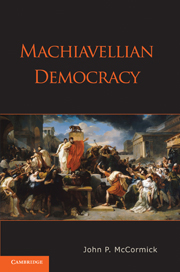7 - Post-Electoral Republics and the People's Tribunate Revived
Published online by Cambridge University Press: 05 June 2012
Summary
The grandi's ambition will soon destroy a polity if not subdued in various ways and through various modes.… Rome would have become servile much sooner if the plebs had not always checked the nobility's ambition.
Machiavelli, Discourses I.37In polities like Rome and Athens, the people are princes.…
Machiavelli, Discourses I.58James Madison famously redefined republics as regimes characterized by electoral representation and by “the total exclusion of the people in their collective capacity” from the workings of government. Very shortly then before “democracy” would reappear on the Western political horizon, Madison, like most of his fellow eighteenth-century republicans, had already precluded from the democratic agenda prominent features of earlier popular governments or governi larghi: class-specific magistracies or assemblies; socioeconomically unbiased methods for selecting public officials; and formalized procedures through which citizens directly deliberate over and decide public affairs. Madison's rationale was not quantitative but qualitative: it was not the scale of modern regimes that necessitated representation but rather the assumption that elections conducted over large territories would generally produce the “best” statesmen. Arguably, the aristocratic character of elections and the abandonment of class-specific or directly participatory practices portended the pacification of modern democracy before its triumph.
True enough, Madison was less elitist than most of his American contemporaries, and he would become more politically egalitarian not long after the ratification of the U.S. Constitution, when he helped found the first political party in history to adopt the designation “democratic.”
- Type
- Chapter
- Information
- Machiavellian Democracy , pp. 170 - 188Publisher: Cambridge University PressPrint publication year: 2011
- 2
- Cited by

